初中英语中考语法名词性从句
(完整版)初中英语名词性从句

名词性从句(这个应该不考吧)名词性从句是由if, whether, that 和各种疑问词充当连接词所引导的从句,其功同名词一样。
一.主语从句1. 主语从句的语序主语从句要求使用陈述句语序,而非一般疑问句语序。
如:What surprised me most was that the little girl could play the violin so well.使我感到惊讶的是这个小女孩的小提琴拉得太好了。
How he was successful is still a puzzle.他是如何成功的仍然是个谜。
2. 连接词的选用(1)that和what的选用that和what都可引导主语从句。
what除起连接作用外,还在名词性从句中充当某些成分,可作从句的主语、宾语或表语。
而that在名词性从句中不充当任何成分,无词义,只起连接词作用。
如:What he wants is a book. 他想要的是一本书。
That light travels in straight lines is known to all. 众所周知,光线沿直线运行。
(2)if和whether的选用引导主语从句,不能用if,只能用whether。
如:Whether we will hold a party in the open air tomorrow depends on the weather.我们明天是否在户外开晚会要看天气而定。
(3)其它连接代词和副词的选用根据主语从句的具体意义,正确的选择who, which, when, where, why, how等连接词,这些连接词既有疑问含义,又起连接作用,同时在从句中充当各种成分。
如:When we shall hold our sports meet is not decided. 我们何时举行运动会还没有决定。
Who broke the glass yesterday is not clear. 还不清楚昨天谁打破了玻璃。
初中英语知识点归纳名词性从句和名词性从句的用法区别

初中英语知识点归纳名词性从句和名词性从句的用法区别名词性从句是英语语法中的一个重要部分,它充当名词的作用。
名词性从句分为名词性从句和名词性从句的用法区别。
一、名词性从句的概念和特点名词性从句是一种从句,它在句中担任名词的角色。
名词从句可以作主语、宾语、表语和同位语等。
名词性从句的特点是:1. 由连接词that、whether/if, who, whom, whose, what, which等引导。
2. 可以在主句中作主语、宾语、表语和同位语等。
3. 名词从句不可以独立存在,依附于主句成分的分量。
4. 名词从句既可以作状语,也可以作宾补,修饰动词、形容词或副词。
二、名词性从句的用法1. 名词性从句作主语例如:What you said is true.(你所说的是真的。
)2. 名词性从句作宾语例如:I know that he is a doctor.(我知道他是医生。
)3. 名词性从句作表语例如:My dream is that I can travel around the world.(我的梦想是能环游世界。
)4. 名词性从句作同位语例如:The news that he won the competition made me excited.(他赢得比赛的消息让我兴奋。
)三、名词从句的用法区别名词性从句分为两种:名词性从句和名词性从句。
1. 名词性从句用于陈述句和一般疑问句中,用连接词that引导;而名词性从句多用于特殊疑问句中,用连接词what, which, who, whom, whose等引导。
例如:That he passed the exam pleased his parents.(他通过了考试使他的父母高兴。
)What he said surprised us.(他说的话让我们惊讶。
)2. 名词性从句用于陈述句时,从句中的谓语动词用陈述语气;而名词性从句在特殊疑问句中,从句中的谓语动词用疑问语气。
初中英语中的名词性从句详解
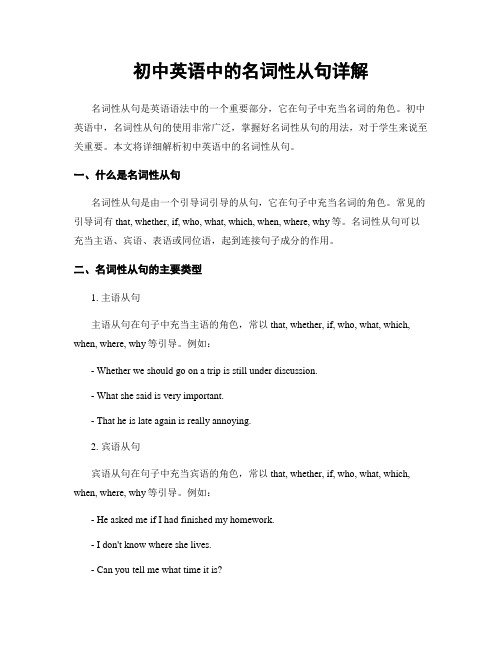
初中英语中的名词性从句详解名词性从句是英语语法中的一个重要部分,它在句子中充当名词的角色。
初中英语中,名词性从句的使用非常广泛,掌握好名词性从句的用法,对于学生来说至关重要。
本文将详细解析初中英语中的名词性从句。
一、什么是名词性从句名词性从句是由一个引导词引导的从句,它在句子中充当名词的角色。
常见的引导词有that, whether, if, who, what, which, when, where, why等。
名词性从句可以充当主语、宾语、表语或同位语,起到连接句子成分的作用。
二、名词性从句的主要类型1. 主语从句主语从句在句子中充当主语的角色,常以that, whether, if, who, what, which, when, where, why等引导。
例如:- Whether we should go on a trip is still under discussion.- What she said is very important.- That he is late again is really annoying.2. 宾语从句宾语从句在句子中充当宾语的角色,常以that, whether, if, who, what, which, when, where, why等引导。
例如:- He asked me if I had finished my homework.- I don't know where she lives.- Can you tell me what time it is?3. 表语从句表语从句在句子中充当表语的角色,常以that, whether, if, who, what, which, when, where, why等引导。
例如:- The problem is whether we can solve it.- His dream is to become a famous singer.- The question is who will be the winner.4. 同位语从句同位语从句在句子中充当同位语的角色,常以that, whether, if, who, what, which, when, where, why等引导。
名词性从句的三种类型及例句解析
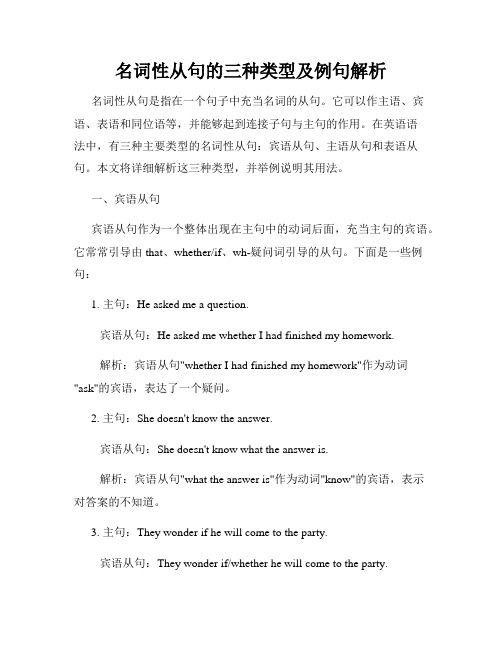
名词性从句的三种类型及例句解析名词性从句是指在一个句子中充当名词的从句。
它可以作主语、宾语、表语和同位语等,并能够起到连接子句与主句的作用。
在英语语法中,有三种主要类型的名词性从句:宾语从句、主语从句和表语从句。
本文将详细解析这三种类型,并举例说明其用法。
一、宾语从句宾语从句作为一个整体出现在主句中的动词后面,充当主句的宾语。
它常常引导由that、whether/if、wh-疑问词引导的从句。
下面是一些例句:1. 主句:He asked me a question.宾语从句:He asked me whether I had finished my homework.解析:宾语从句"whether I had finished my homework"作为动词"ask"的宾语,表达了一个疑问。
2. 主句:She doesn't know the answer.宾语从句:She doesn't know what the answer is.解析:宾语从句"what the answer is"作为动词"know"的宾语,表示对答案的不知道。
3. 主句:They wonder if he will come to the party.宾语从句:They wonder if/whether he will come to the party.解析:宾语从句"if/whether he will come to the party"作为动词"wonder"的宾语,表达了对他是否会来参加派对的疑问。
二、主语从句主语从句作为一个整体出现在句子的最前面,充当主句的主语。
它通常由that引导,也可以由wh-疑问词引导。
以下是一些例句:1. 主句:It is important to learn a foreign language.主语从句:That she is a hardworking student is important.解析:主语从句"That she is a hardworking student"作为句子的主语,强调了她是一个勤奋的学生的重要性。
名词性从句详解及练习
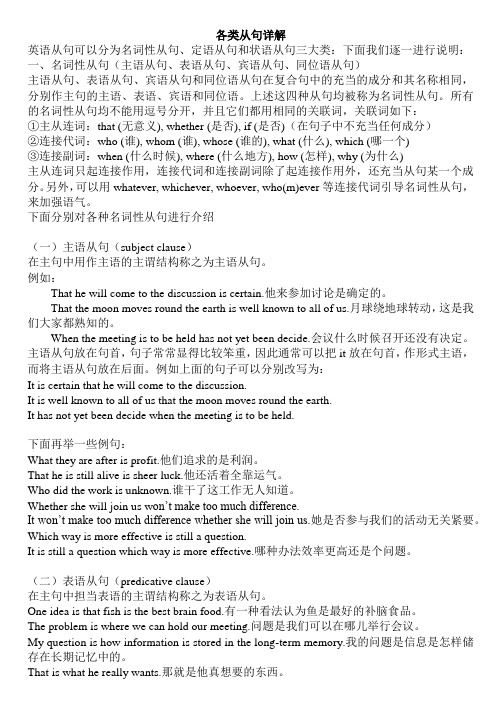
各类从句详解英语从句可以分为名词性从句、定语从句和状语从句三大类:下面我们逐一进行说明:一、名词性从句(主语从句、表语从句、宾语从句、同位语从句)主语从句、表语从句、宾语从句和同位语从句在复合句中的充当的成分和其名称相同,分别作主句的主语、表语、宾语和同位语。
上述这四种从句均被称为名词性从句。
所有的名词性从句均不能用逗号分开,并且它们都用相同的关联词,关联词如下:①主从连词:that (无意义), whether (是否), if (是否)(在句子中不充当任何成分)②连接代词:who (谁), whom (谁), whose (谁的), what (什么), which (哪一个)③连接副词:when (什么时候), where (什么地方), how (怎样), why (为什么)主从连词只起连接作用,连接代词和连接副词除了起连接作用外,还充当从句某一个成分。
另外,可以用whatever, whichever, whoever, who(m)ever等连接代词引导名词性从句,来加强语气。
下面分别对各种名词性从句进行介绍(一)主语从句(subject clause)在主句中用作主语的主谓结构称之为主语从句。
例如:That he will come to the discussion is certain.他来参加讨论是确定的。
That the moon moves round the earth is well known to all of us.月球绕地球转动,这是我们大家都熟知的。
When the meeting is to be held has not yet been decide.会议什么时候召开还没有决定。
主语从句放在句首,句子常常显得比较笨重,因此通常可以把it放在句首,作形式主语,而将主语从句放在后面。
例如上面的句子可以分别改写为:It is certain that he will come to the discussion.It is well known to all of us that the moon moves round the earth.It has not yet been decide when the meeting is to be held.下面再举一些例句:What they are after is profit.他们追求的是利润。
初中英语语法专题—名词性从句讲解
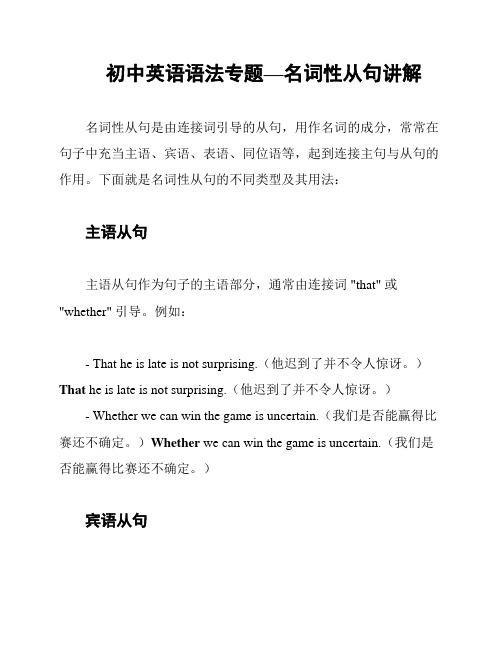
初中英语语法专题—名词性从句讲解名词性从句是由连接词引导的从句,用作名词的成分,常常在句子中充当主语、宾语、表语、同位语等,起到连接主句与从句的作用。
下面就是名词性从句的不同类型及其用法:主语从句主语从句作为句子的主语部分,通常由连接词 "that" 或"whether" 引导。
例如:- That he is late is not surprising.(他迟到了并不令人惊讶。
)That he is late is not surprising.(他迟到了并不令人惊讶。
)- Whether we can win the game is uncertain.(我们是否能赢得比赛还不确定。
)Whether we can win the game is uncertain.(我们是否能赢得比赛还不确定。
)宾语从句宾语从句作为句子的宾语,通常由连接词 "that" 或 "whether"引导。
例如:- I wonder whether he has finished his homework.(我想知道他是否完成了他的作业。
)whether he has finished his homework.(我想知道他是否完成了他的作业。
)表语从句表语从句用来补充说明主语的性质或状态,通常由连接词"that" 或 "whether" 引导。
例如:- The truth is that he is a good student.(事实是他是个好学生。
)that he is a good student.(事实是他是个好学生。
)- My concern is whether he understands the instructions.(我关心的是他是否理解了这些指示。
)whether he understands the instructions.(我关心的是他是否理解了这些指示。
中考英语语法之名词性从句
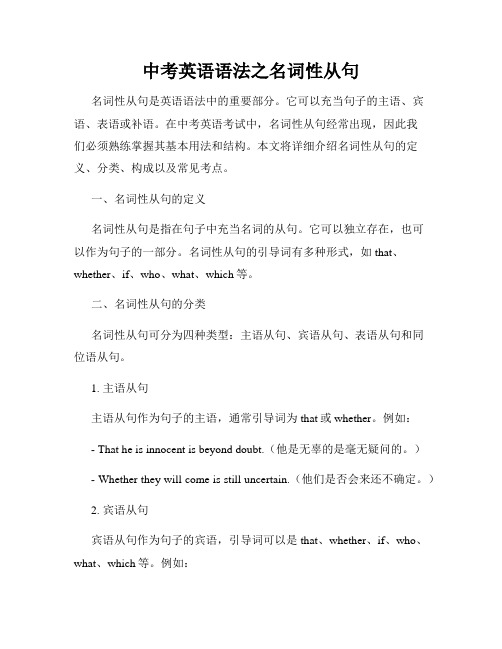
中考英语语法之名词性从句名词性从句是英语语法中的重要部分。
它可以充当句子的主语、宾语、表语或补语。
在中考英语考试中,名词性从句经常出现,因此我们必须熟练掌握其基本用法和结构。
本文将详细介绍名词性从句的定义、分类、构成以及常见考点。
一、名词性从句的定义名词性从句是指在句子中充当名词的从句。
它可以独立存在,也可以作为句子的一部分。
名词性从句的引导词有多种形式,如that、whether、if、who、what、which等。
二、名词性从句的分类名词性从句可分为四种类型:主语从句、宾语从句、表语从句和同位语从句。
1. 主语从句主语从句作为句子的主语,通常引导词为that或whether。
例如:- That he is innocent is beyond doubt.(他是无辜的是毫无疑问的。
)- Whether they will come is still uncertain.(他们是否会来还不确定。
)2. 宾语从句宾语从句作为句子的宾语,引导词可以是that、whether、if、who、what、which等。
例如:- I don't know if/whether he will come.(我不知道他是否会来。
)- She asked me what my favorite color was.(她问我最喜欢的颜色是什么。
)3. 表语从句表语从句用来说明主语的身份、性质等,引导词通常是that、whether或连接代词。
例如:- My hope is that they will succeed.(我的希望是他们会成功。
)- The question is whether we should agree or not.(问题是我们是否应该同意。
)4. 同位语从句同位语从句用来解释说明名词的含义或具体细节,通常引导词为that。
例如:- The fact that he passed the exam is not surprising.(他通过了考试这个事实并不令人惊讶。
初中英语知识点归纳名词性从句的引导词和结构

初中英语知识点归纳名词性从句的引导词和结构名词性从句是英语语法中的一个重要概念,它可以在句子中作主语、宾语、表语或补语等成分。
在名词性从句中,引导词起着引导作用,决定了从句的结构和意义。
本文将对名词性从句中的引导词和结构进行归纳总结。
一、名词性从句的引导词1. 连词 that在许多情况下,名词性从句可以由连词“that”引导。
例如:- I know that he is a good student.(我知道他是一个好学生。
)这里,“that he is a good student”是由“that”引导的名词性从句,在句中作宾语。
2. 连词 if/whether名词性从句还可以由连词“if”或“whether”引导,用于引导间接疑问句等情况。
例如:- I wonder if/whether he will come to the party.(我想知道他是否会来参加聚会。
)这里,“if/whether he will come to the party”是由“if/whether”引导的名词性从句,在句中作宾语。
3. 连词 who/whom/whose/which/what除了“that”和“if/whether”,名词性从句还可以由其他疑问词引导。
例如:- Who is responsible for the accident?(谁对这起事故负责?)这里,“Who is responsible for the accident”是由“Who”引导的名词性从句,在句中作主语。
4. 连词 when/where/why/how名词性从句还可以由疑问副词引导。
例如:- I still remember when we first met.(我仍然记得我们初次见面的时候。
)这里,“when we first met”是由“when”引导的名词性从句,在句中作宾语。
二、名词性从句的结构1. 主语从句名词性从句可以出现在主语的位置。
名词性从句初中名词性从句的三种类型
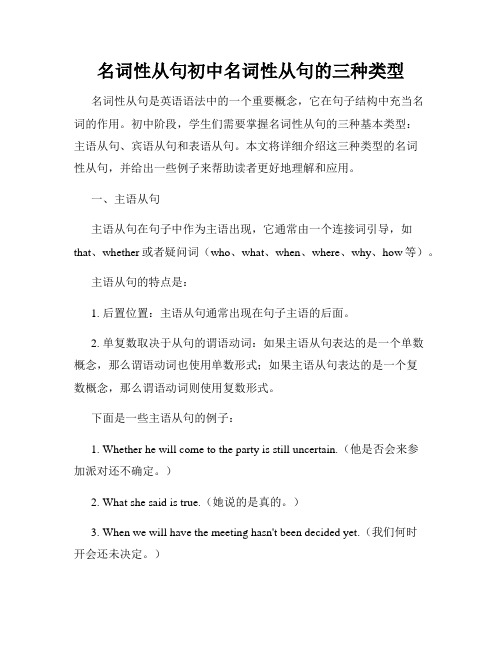
名词性从句初中名词性从句的三种类型名词性从句是英语语法中的一个重要概念,它在句子结构中充当名词的作用。
初中阶段,学生们需要掌握名词性从句的三种基本类型:主语从句、宾语从句和表语从句。
本文将详细介绍这三种类型的名词性从句,并给出一些例子来帮助读者更好地理解和应用。
一、主语从句主语从句在句子中作为主语出现,它通常由一个连接词引导,如that、whether或者疑问词(who、what、when、where、why、how等)。
主语从句的特点是:1. 后置位置:主语从句通常出现在句子主语的后面。
2. 单复数取决于从句的谓语动词:如果主语从句表达的是一个单数概念,那么谓语动词也使用单数形式;如果主语从句表达的是一个复数概念,那么谓语动词则使用复数形式。
下面是一些主语从句的例子:1. Whether he will come to the party is still uncertain.(他是否会来参加派对还不确定。
)2. What she said is true.(她说的是真的。
)3. When we will have the meeting hasn't been decided yet.(我们何时开会还未决定。
)二、宾语从句宾语从句在句子中作为动词的宾语出现,它通常由一个连接词引导,如that、whether或者疑问词。
宾语从句的特点是:1. 通常出现在及物动词或介词后面,作为动词的宾语。
2. 通常用陈述语序(即主语+谓语),而不是疑问句语序。
下面是一些宾语从句的例子:1. He doesn't know what he should do next.(他不知道接下来该怎么办。
)2. I wonder if they have arrived.(我想知道是否他们已经到达。
)3. She asked me where I had been.(她问我去了哪里。
)三、表语从句表语从句在句子中作为主语或宾语的补足语出现,通常由一个连接词引导,如that、whether或者疑问词。
初中英语语法——名词性从句讲解及练习
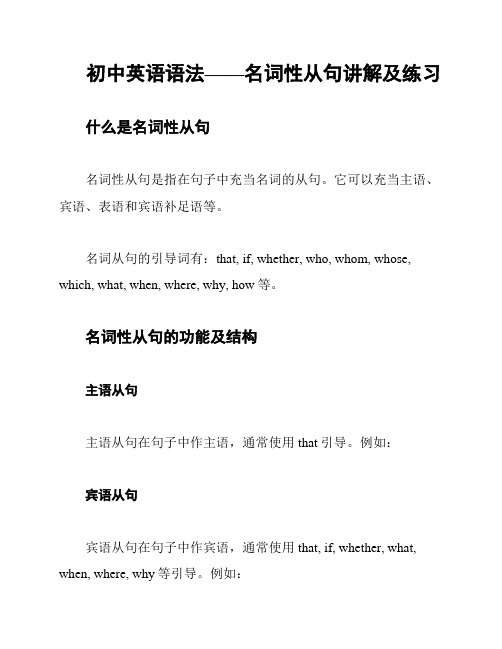
初中英语语法——名词性从句讲解及练习什么是名词性从句名词性从句是指在句子中充当名词的从句。
它可以充当主语、宾语、表语和宾语补足语等。
名词从句的引导词有:that, if, whether, who, whom, whose, which, what, when, where, why, how等。
名词性从句的功能及结构主语从句主语从句在句子中作主语,通常使用that引导。
例如:宾语从句宾语从句在句子中作宾语,通常使用that, if, whether, what, when, where, why等引导。
例如:- She asked me what I wanted for dinner.(她问我晚饭想吃什么。
)what I wanted for dinner.(她问我晚饭想吃什么。
)表语从句表语从句在句子中作表语,通常使用that, if, whether等引导。
例如:- My only hope is that the weather will be good tomorrow.(我唯一的希望是明天天气好。
)that the weather will be good tomorrow.(我唯一的希望是明天天气好。
)- The problem is whether he can solve it.(问题在于他能否解决。
)whether he can solve it.(问题在于他能否解决。
)宾补从句宾补从句在句子中作宾补,通常使用that, if, whether等引导。
例如:- They made me believe that anything is possible.(他们让我相信一切皆有可能。
)that anything is possible.(他们让我相信一切皆有可能。
)- I find it amazing that she can speak five languages.(我发现她能说五种语言真是令人惊奇。
初中四大从句

初中四大从句初中四大从句是指名词性从句、定语从句、状语从句和主语从句。
这四种从句在英语学习中非常重要,掌握它们的用法可以帮助我们更好地理解和运用英语语法。
下面,我将分别介绍这四种从句的用法和例句。
一、名词性从句名词性从句是指在句子中充当名词的从句,可以作主语、宾语、表语或同位语。
名词性从句通常由连词that, whether, if, who, whom, whose, what, which等引导。
1. 主语从句That he is a liar is beyond doubt.(他是个骗子是毫无疑问的。
)Whether he will come or not is still uncertain.(他是否会来还不确定。
)2. 宾语从句I don't know what he is doing now.(我不知道他现在在干什么。
) She asked me if I had finished my homework.(她问我是否完成了作业。
)3. 表语从句The problem is whether we should go or stay.(问题是我们是该走还是留。
)The fact is that he is always late.(事实是他总是迟到。
)4. 同位语从句The news that he won the prize surprised us all.(他获奖的消息让我们都很惊讶。
)The idea that we should work hard is very important.(我们应该努力工作的想法非常重要。
)二、定语从句定语从句是指修饰名词或代词的从句,通常由关系代词who, whom, whose, that, which等引导。
1. 修饰人的定语从句The girl who is singing is my sister.(唱歌的女孩是我妹妹。
)The teacher whom we met yesterday is very kind.(昨天我们遇到的老师非常友好。
初三英语语法串讲从句的分类与用法
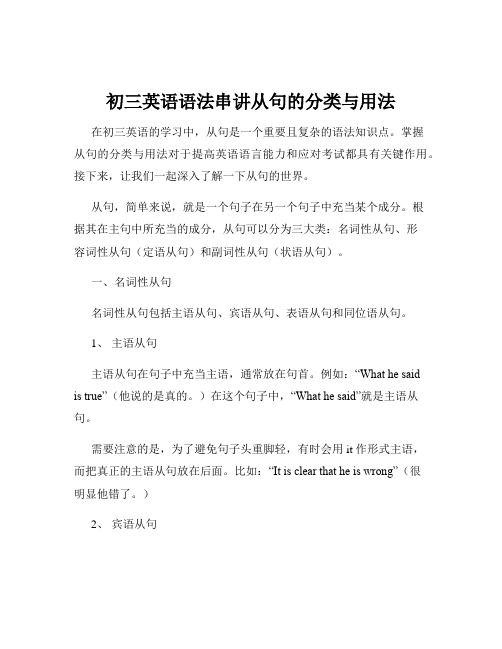
初三英语语法串讲从句的分类与用法在初三英语的学习中,从句是一个重要且复杂的语法知识点。
掌握从句的分类与用法对于提高英语语言能力和应对考试都具有关键作用。
接下来,让我们一起深入了解一下从句的世界。
从句,简单来说,就是一个句子在另一个句子中充当某个成分。
根据其在主句中所充当的成分,从句可以分为三大类:名词性从句、形容词性从句(定语从句)和副词性从句(状语从句)。
一、名词性从句名词性从句包括主语从句、宾语从句、表语从句和同位语从句。
1、主语从句主语从句在句子中充当主语,通常放在句首。
例如:“What he saidis true”(他说的是真的。
)在这个句子中,“What he said”就是主语从句。
需要注意的是,为了避免句子头重脚轻,有时会用 it 作形式主语,而把真正的主语从句放在后面。
比如:“It is clear that he is wrong”(很明显他错了。
)2、宾语从句宾语从句在句子中充当宾语,常跟在及物动词、介词或某些形容词后面。
例如:“I believe that he is honest”(我相信他是诚实的。
)“We are interested in what you said”(我们对你所说的感兴趣。
)宾语从句的语序要用陈述句语序,即“主语+谓语+其他”。
同时,要注意宾语从句的时态,要根据主句的时态来变化。
3、表语从句表语从句在句子中充当表语,位于系动词之后。
例如:“The problem is whether we can finish the work on time”(问题是我们能否按时完成工作。
)4、同位语从句同位语从句用于解释说明前面的名词的具体内容。
常见的名词有:fact, news, idea, thought, hope 等。
例如:“The news that he will come is true”(他要来的消息是真的。
)二、形容词性从句(定语从句)定语从句在句中起定语作用,修饰一个名词或代词。
初中英语知识点归纳名词性从句的分类和引导词

初中英语知识点归纳名词性从句的分类和引导词名词性从句是英语语法中的一个重要部分,它在句子中起到名词的作用。
在初中英语中,名词性从句主要包括主语从句、宾语从句、表语从句和同位语从句。
本文将对这四种名词性从句的分类和引导词进行详细的归纳和总结。
一、主语从句主语从句在句中作主语,常常用来引导主语从句的引导词有:that, whether, who, whom, what, which, whoever, whatever, whichever等。
1. 引导词“that”该引导词常用于陈述句,如:- That he is a good student is well known to everyone.(他是个好学生这一点是众所周知的。
)- That we should protect the environment is of great importance.(保护环境非常重要。
)2. 引导词“whether”该引导词常用于一般疑问句和特殊疑问句中,如:- Whether he will come to the party or not is still uncertain.(他是否会来参加派对还不确定。
)- I don't know whether he is telling the truth.(我不知道他是否说的是真话。
)3. 引导词“who, whom”这两个引导词常用于主语从句中表示人,who作为主语,whom作为宾语,如:- Who will take care of the baby is not yet decided.(谁来照顾这个婴儿还没有确定。
)- Whom he loves is none of our business.(他爱谁与我们无关。
)4. 引导词“what”该引导词常用于主语从句中表示事物,如:- What makes him happy is playing basketball.(使他快乐的是打篮球。
初中的解析名词性从句的类型与用法
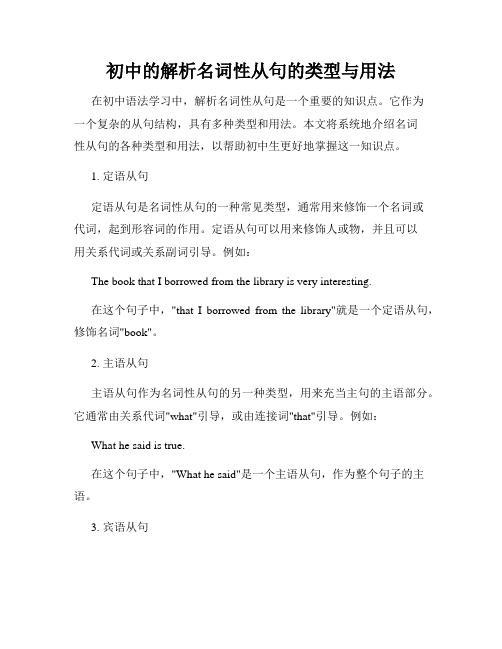
初中的解析名词性从句的类型与用法在初中语法学习中,解析名词性从句是一个重要的知识点。
它作为一个复杂的从句结构,具有多种类型和用法。
本文将系统地介绍名词性从句的各种类型和用法,以帮助初中生更好地掌握这一知识点。
1. 定语从句定语从句是名词性从句的一种常见类型,通常用来修饰一个名词或代词,起到形容词的作用。
定语从句可以用来修饰人或物,并且可以用关系代词或关系副词引导。
例如:The book that I borrowed from the library is very interesting.在这个句子中,"that I borrowed from the library"就是一个定语从句,修饰名词"book"。
2. 主语从句主语从句作为名词性从句的另一种类型,用来充当主句的主语部分。
它通常由关系代词"what"引导,或由连接词"that"引导。
例如:What he said is true.在这个句子中,"What he said"是一个主语从句,作为整个句子的主语。
3. 宾语从句宾语从句作为名词性从句的另一种类型,用来充当主句的宾语部分。
它可以由关系代词或连接词引导,具体使用哪种引导词要根据句子需要来决定。
例如:I believe that he will come to the party.在这个句子中,"that he will come to the party"是一个宾语从句,作为整个句子的宾语。
4. 表语从句表语从句作为名词性从句的另一种类型,用来充当主句的表语部分,通常由连接词"that"引导。
例如:The fact that she passed the exam makes her parents proud.在这个句子中,"that she passed the exam"是一个表语从句,作为整个句子的表语。
初中英语知识点归纳常见名词性从句的用法
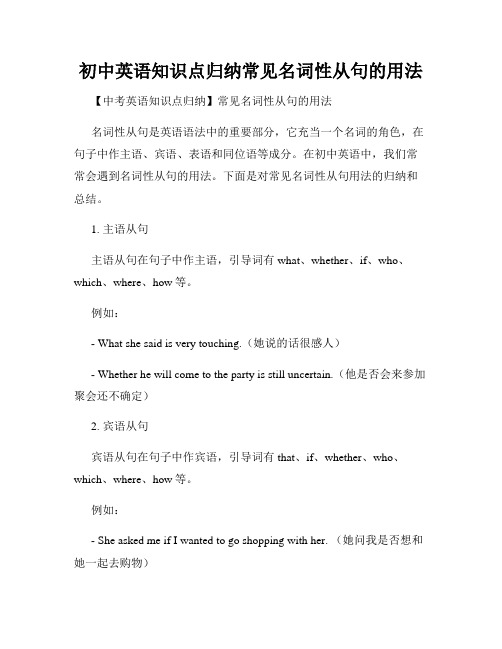
初中英语知识点归纳常见名词性从句的用法【中考英语知识点归纳】常见名词性从句的用法名词性从句是英语语法中的重要部分,它充当一个名词的角色,在句子中作主语、宾语、表语和同位语等成分。
在初中英语中,我们常常会遇到名词性从句的用法。
下面是对常见名词性从句用法的归纳和总结。
1. 主语从句主语从句在句子中作主语,引导词有 what、whether、if、who、which、where、how等。
例如:- What she said is very touching.(她说的话很感人)- Whether he will come to the party is still uncertain.(他是否会来参加聚会还不确定)2. 宾语从句宾语从句在句子中作宾语,引导词有 that、if、whether、who、which、where、how等。
例如:- She asked me if I wanted to go shopping with her. (她问我是否想和她一起去购物)- He doesn't know where he lost his pen.(他不知道他丢了笔的地方)3. 表语从句表语从句在句子中作表语,引导词有 that、whether等。
例如:- The important thing is that we need to be united.(重要的是我们需要团结一致)- The fact is whether we can finish the task on time.(事实是我们是否能按时完成任务)4. 同位语从句同位语从句在句子中解释或说明一个名词,引导词有 that。
例如:- The news that he passed the exam pleased his parents.(他通过考试的消息让他的父母很高兴)- The idea that learning English is important to our future is widely accepted.(英语对我们的未来很重要的观点被广泛接受)5. 定语从句定语从句在句子中修饰一个名词,引导词有 that、who、which、where、whose等。
2024年中考英语专题复习之名词性从句用法归纳
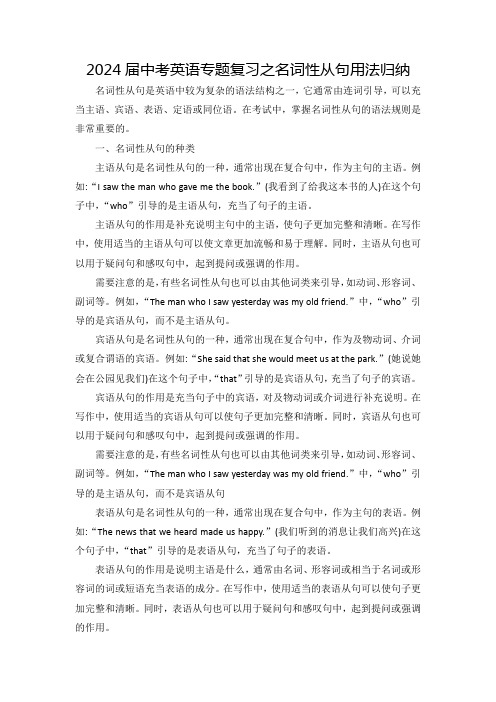
2024届中考英语专题复习之名词性从句用法归纳名词性从句是英语中较为复杂的语法结构之一,它通常由连词引导,可以充当主语、宾语、表语、定语或同位语。
在考试中,掌握名词性从句的语法规则是非常重要的。
一、名词性从句的种类主语从句是名词性从句的一种,通常出现在复合句中,作为主句的主语。
例如:“I saw the man who gave me the book.”(我看到了给我这本书的人)在这个句子中,“who”引导的是主语从句,充当了句子的主语。
主语从句的作用是补充说明主句中的主语,使句子更加完整和清晰。
在写作中,使用适当的主语从句可以使文章更加流畅和易于理解。
同时,主语从句也可以用于疑问句和感叹句中,起到提问或强调的作用。
需要注意的是,有些名词性从句也可以由其他词类来引导,如动词、形容词、副词等。
例如,“The man who I saw yesterday was my old friend.”中,“who”引导的是宾语从句,而不是主语从句。
宾语从句是名词性从句的一种,通常出现在复合句中,作为及物动词、介词或复合谓语的宾语。
例如:“She said that she would meet us at the park.”(她说她会在公园见我们)在这个句子中,“that”引导的是宾语从句,充当了句子的宾语。
宾语从句的作用是充当句子中的宾语,对及物动词或介词进行补充说明。
在写作中,使用适当的宾语从句可以使句子更加完整和清晰。
同时,宾语从句也可以用于疑问句和感叹句中,起到提问或强调的作用。
需要注意的是,有些名词性从句也可以由其他词类来引导,如动词、形容词、副词等。
例如,“The man who I saw yesterday was my old friend.”中,“who”引导的是主语从句,而不是宾语从句表语从句是名词性从句的一种,通常出现在复合句中,作为主句的表语。
例如:“The news that we heard made us happy.”(我们听到的消息让我们高兴)在这个句子中,“that”引导的是表语从句,充当了句子的表语。
初中英语语法三大从句汇总
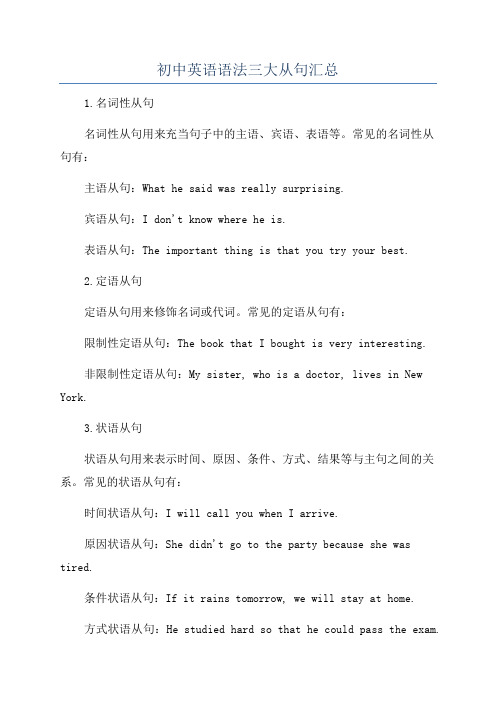
初中英语语法三大从句汇总
1.名词性从句
名词性从句用来充当句子中的主语、宾语、表语等。
常见的名词性从句有:
主语从句:What he said was really surprising.
宾语从句:I don't know where he is.
表语从句:The important thing is that you try your best.
2.定语从句
定语从句用来修饰名词或代词。
常见的定语从句有:
限制性定语从句:The book that I bought is very interesting.
非限制性定语从句:My sister, who is a doctor, lives in New York.
3.状语从句
状语从句用来表示时间、原因、条件、方式、结果等与主句之间的关系。
常见的状语从句有:
时间状语从句:I will call you when I arrive.
原因状语从句:She didn't go to the party because she was tired.
条件状语从句:If it rains tomorrow, we will stay at home.
方式状语从句:He studied hard so that he could pass the exam.
结果状语从句:She was so tired that she couldn't walk.。
初中知识点归纳名词性从句的种类与用法

初中知识点归纳名词性从句的种类与用法名词性从句是从句在句中充当名词的作用。
它可以在复合句中作主语、宾语、表语、同位语等成分。
根据从句的引导词和从句的功能,名词性从句可以分为四种类型:主语从句、宾语从句、表语从句和同位语从句。
一、主语从句主语从句在句中充当主语,常常由连接词“that”引导,也可以由连接词“whether/if”或疑问词引导。
例句:1. That he is innocent is beyond doubt.(他是无辜的是毫无疑问的。
)2. Whether we can succeed or not remains to be seen.(我们能否成功还有待观察。
)二、宾语从句宾语从句在复合句中作谓语动词的宾语,通常由连接词“that”引导,也可以由连接词“whether/if”或疑问词引导。
例句:1. I believe that he is telling the truth.(我相信他在说实话。
)2. They asked whether/if we could attend the meeting.(他们问我们是否能参加会议。
)三、表语从句表语从句在句中充当表语,常由连接词“that”引导,也可以由连接词“whether/if”或疑问词引导。
例句:1. The truth is that he is a good singer.(事实是他是一个好歌手。
)2. Her worry is whether/if she can pass the exam.(她担心的是她能否通过考试。
)四、同位语从句同位语从句在句中与一个名词或代词并列,表示对其进行解释、说明或补充说明,并且由连接词“that”引导。
例句:1. The fact that he won the competition surprised everyone.(他赢得比赛的事实让每个人都感到惊讶。
)2. His question is whether we are ready to take on the challenge.(他的问题是我们是否准备好接受挑战。
初中英语语法讲解--名词性从句、形容词性从句、副词性从句三大从句讲解

初中英语语法讲解:名词性从句、形容词性从句、副词性从句一、名词性从句1. 概念名词性从句是指在句子中起名词作用的从句,包括主语从句、宾语从句、表语从句和同位语从句。
2. 搭配与用法主语从句:作为句子的主语,通常使用连接词that(无实际意义,不可省略)或whether/if(表示选择,不可省略)引导。
例句:That he will come to the party remains uncertain.(他是否会来参加聚会还不确定。
)宾语从句:作为动词或介词的宾语,可以由that、if/whether、特殊疑问词等引导。
例句:I don't know if he will come.(我不知道他是否会来。
)表语从句:作为连系动词的表语,通常由that引导,但that通常可以省略。
例句:The fact is that he didn't come.(事实是,他没来。
)同位语从句:用于解释说明前面的名词,通常由that引导,但that不可省略。
例句:The news that he resigned was a surprise.(他辞职的消息是个惊喜。
)3. 注意事项宾语从句中,当主句的谓语动词是think、believe、expect、suppose等表示心理活动的动词时,如果宾语从句表示的是事实,则宾语从句的否定通常要转移到主句上来表达。
例句:I don't think he will come.(我认为他不会来。
)在名词性从句中,一般不使用疑问句语序,而是使用陈述句语序。
例句:Can you tell me how I can get to the park?(请告诉我如何去公园?)而不是Can you tell me how can I get to the park?二、形容词性从句(定语从句)1. 概念形容词性从句,也称为定语从句,用于修饰或限定一个名词或代词,描述这个名词或代词的性质或特征。
初中英语语法复习讲义之名词性从句
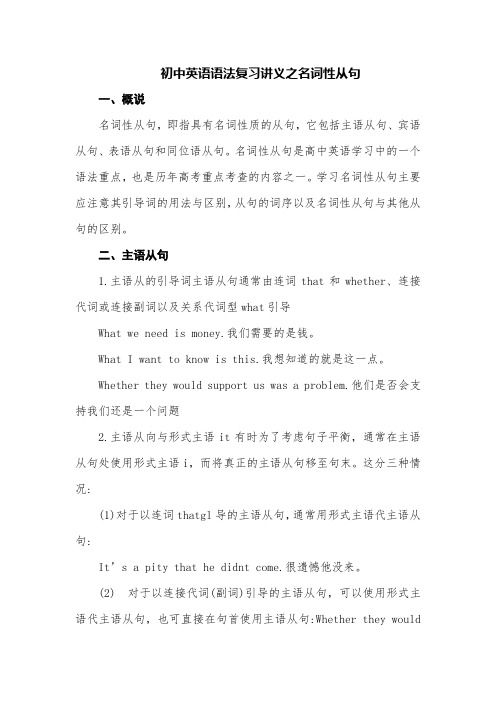
初中英语语法复习讲义之名词性从句一、概说名词性从句,即指具有名词性质的从句,它包括主语从句、宾语从句、表语从句和同位语从句。
名词性从句是高中英语学习中的一个语法重点,也是历年高考重点考查的内容之一。
学习名词性从句主要应注意其引导词的用法与区别,从句的词序以及名词性从句与其他从句的区别。
二、主语从句1.主语从的引导词主语从句通常由连词that和whether、连接代词或连接副词以及关系代词型what引导What we need is money.我们需要的是钱。
What I want to know is this.我想知道的就是这一点。
Whether they would support us was a problem.他们是否会支持我们还是一个问题2.主语从向与形式主语it有时为了考虑句子平衡,通常在主语从句处使用形式主语i,而将真正的主语从句移至句末。
这分三种情况:(1)对于以连词thatgl导的主语从句,通常用形式主语代主语从句:It’s a pity that he didnt come.很遗憾他没来。
(2)对于以连接代词(副词)引导的主语从句,可以使用形式主语代主语从句,也可直接在句首使用主语从句:Whether they wouldsupport us was a problem.他们是否会支持我们还是一个问题。
It was a problem whether they would support us.他们是否会支持我们还是一个问题。
(3)对关系代词型what引导的主语从,通常不用形式主语,总是主语从句放在句首:What we need is money.我们需要的是钱。
What I want to know is this.我想知道的就是这一点。
(4)如果句子是疑问句,则必须用带形式主语it的结构:Is it true that he is the girl's father? 他是那女孩的父亲,是真的吗?How is it that you are late again? 你怎么又迟到了?3.连词that的省略问题引导主语从句的连词that有时可省,有时不能省,其原则是:若ha导的主语从句直接位于句首,则ha不能省略;若hat引导的主语从句位于句末,而在句首使用了形式主语it,则that则可以省略: That you didn’t go to the talk was a pity. 很遗憾你没去听报告。
- 1、下载文档前请自行甄别文档内容的完整性,平台不提供额外的编辑、内容补充、找答案等附加服务。
- 2、"仅部分预览"的文档,不可在线预览部分如存在完整性等问题,可反馈申请退款(可完整预览的文档不适用该条件!)。
- 3、如文档侵犯您的权益,请联系客服反馈,我们会尽快为您处理(人工客服工作时间:9:00-18:30)。
上海中考英语语法考点:名词性从句名词性从句:在句子中起名词作用的句子叫名词性从句。
在复合句中能作主语、宾语、表语、同位语、介词宾语等。
形容词性从句即定语从句;副词性从句即状语从句;名词性从句包括主语从句,宾语从句,表语从句和同位语从句。
一、引导名词性从句的连接词1,从属连词五个:that无词义,在从句中不做成分,在宾语从句中可省略。
whether,if 有词义,在从句中不做成分,不可以省略。
as if, as though不做成分。
2,连接代词九个:what, whatever, who, whoever, whom, whomever, whose, which, whichever,有词义,在从句中做成分,不可以省略。
3,连接副词七个:when, where, how, why, whenever, wherever, however有词义,在从句中做状语,不可以省略。
二. 主语从句1,主语从句:通常由下列词引导:从属连词that,whether ;连接代词what,who,which,whatever,whoever,whom;连接副词how,when,where,why 等。
It is known to us how he became a writer.2,常用it作形式主语放于句首,而把主语从句置于句末。
谓语动词一般用单数形式。
It is a fact that,It is an honor that,It is common,It is a pity that,It is said that,t seems that, It is natural that 3,what 与that 在引导主语从句时的区别what 引导主语从句时在从句中充当句子成分,如主语.宾语.表语,而that则不然。
What you said yesterday is right. That she is still alive is a consolation.三、宾语从句1.由连接词that引导的宾语从句,that在句中不担任任何成分,常被省去。
2,用who,whom, which, whose, what, when, where, why, how, whoever, whatever, whichever等关联词引导的宾语从句相当于特殊疑问句,句子语序要用陈述语序。
用whether或if引导的宾语从句,保持陈述语序。
3,think, believe, imagine, suppose,guess, expect, fancy, consider等动词引起的否定性宾语从句中,要否定前移。
doubt whether, don’t doubt that…四、表语从句1、在复合句中,位于系动词之后作表语的从句叫表语从句。
引导表语从句的关联词与引导主语从句的关联词大致一样,表语从句位于连系动词后,有时用asif。
the reason is that … It is because … It appears/seems that… It happens that… It turns out that… It looks as if… It seems as if…2、当主语是reason时,表语从句要用that引导而不是because。
whether 可引导表语从句,但if不可以。
五、同位语从句1、同位语从句说明其前面的名词的具体内容。
同位语从句通常由that引导,that不可以省略, 可由whether引导,不可用if.2、同位语从句的先行词是一些有限的抽象性名词,如belief, advice, demand, doubt, possibility, thought, proposal, case, fact, hope, idea, information, message,news, order, problem, promise, request, suggestion, wish, word, reason, question, truth, conclusion, result.等。
而定语从句的先行词可以是任何物和人。
3、同位语从句与定语从句的区别1)定语从句是形容词性的,与先行词之间存在所属关系,起修饰限定的作用。
同位语从句是名词性的,与先行词是同位或等同的关系, 起补充说明的作用。
2)定语从句中的that既代替先行词,同时在从句中作主语或宾语,而同位语从句中的that是连词,不充当句中任何成分。
The news that he told me is that Tom would go abroad next year. 定从The news that Tom would go abroad is told by him. 同从,that不可省略。
3)What不能引导定语从句,但可以引导同位语从句。
I didn’t have the idea what you mean.4)How, when, where, why的先行词与从句意义相关时,它们是关系副词,引导定从。
不相关时,这些词是连接副词,引导同位语从句。
Do you have any idea where he lives.He solved the problem why the TV was out of order.There is some doubt whether he will come.以上都是同位语从句。
whether, how不可引导定从。
The reason why he was late is that he was ill. 定从六、名词性wh-从句wh-词包括who, whom,. whose, whoever, what, whatever, which, whichever等连接代词和where, when, how, why等连接副词。
wh-从句的语法功能除了和that-从句一样外,还可充当介词宾语、宾语补语和间接宾语等: 主语:How the book will sell depends on its author. 直接宾语:In one's own home one can do what one likes. 间接宾语:The club will give whoever wins a prize. 表语:My question is who will take over president of the Foundation. 宾语补足语:She will name him whatever she wants to. 同位语: I have no idea when he will return. 形容词宾语:I'm not sure why she refused their invitation. 介词宾语: That depends on where we shall go. 七、what 引导的名词性从句1,表示“……的东西或事情”,相当于“the thing that...; all that...; everything that....”:He saves what he earns. What Mary is is the secretary. 玛丽的职务是秘书。
2,表示“……的人或的样子”,相当于the person thatHe is no longer what he was. Who is it that has made Fred what he is now?3,表示“……的数量或数目”,相当于the amount/number thatOur income is now double what it was ten years ago.4,表示“……的时间”, 相当于the time that:After what seemed like hours he came out with a bitter smile.5,表示“……的地方”, 相当于the place thatThis is what they call Salt Lake City.八、whether与if 在作是否的意思时1,可用if的情形:宾语从句一般可用if或whether引导。
2,只用whether的情形1)宾语从句中,在decide, discuss后,有or not时,作介词宾语时,if会引起歧义时,从句放句首时必须用whether。
2)引导主语从句、表语从句、同位语从句及接不定式时。
Could you tell me if you know the answer ?Whether there is life on the moon is an interesting question.Everything depends on whether we have enough money.选择填空1. _____________ you have done might do harm to other people.A. ThatB. WhatC. WhichD. This2. They have no idea at all ____________.A. where he has goneB. where did he goC. which place he has goneD. where he has gone3. _____________ leaves the room last ought to turn off the lights.A. AnyoneB. The personC. WhoeverD. Who4. Upon graduation he asked to be sent to _______________.A. where he is most neededB. where he neededC. where he is mostly neededD. where is he mostly needed5. These photographs will show you _____________.A. what does our village look likeB. what our village looks likeC. how does our village look likeD. how our village looks like6. Can you make sure _____________ the gold ring?A. where Alice had putB. where had Alice putC. where Alice has putD. where has Alice put7. No one can be sure _____________ in a million years.A. what man will look likeB. what will man look likeC. man will look like whatD. what look will man like8. _____________ the Games will be held in Beijing is not known.A. WheneverB. IfC. WhetherD. That9. It worried her a bit _____________ her hair was turning grey.A. whichB. thatC. ifD. for10. _____________ you don’t like him is none of my business.A. WhatB. WhoC. ThatD. Whether11. He asked _____________ for the violin.A. did I pay how muchB. I paid how muchC. how much did I payD. how much I paid12. — Do you remember ____________ he came?— Yes, I do, he came by car. A. how B. when C. that D. if13. _____________ is a fact that English is accepted as an international language.A. ThereB. ThisC. ThatD. It14. Sarah hopes to become a friend of _____________ shares her interests.A. anyoneB. whomeverC. whoeverD. no matter who15. ____________ we can’t get seems better than ____________ we have.A. What; whatB. What; thatC. That; thatD. That; what16. _____________ we’ll go camping tomorrow depends on the weather.A. IfB. WhetherC. ThatD. Where17. It is generally considered unwise to give a child _____________ he or she wants.A. howeverB. whateverC. whicheverD. whenever18. ___________ caused the accident is still a complete mystery.A. WhatB. ThatC. HowD. Where19. It was a matter of ____________ would take the position.A. whoB. whoeverC. whomD. whomever20. — I drove to Zhuhai for the air show last week.— Is that ____________ you had a few days off?A. whyB. whenC. whatD. where21. ___________ has helped to save the drowning girl is worth praising.A. WhoB. The oneC. AnyoneD. Whoever22. These wild flowers are so special I would do _____________ I can to save them.A. thatB. whichC. whicheverD. whatever23. _____________ she couldn’t understand was _____________ fewer and fewer students showed interest in her lessons.A. That; whatB. What; whyC. What; becauseD. Why; that24. What the doctors really doubt is _____________ my mother will recover from the serious disease soon. A. when B. how C. whether D. why25. ____________ is no possibility ___________ Bob can win the first prize in the match. A. There; that B. It; that C. There; whether D. It; whether26. — Are you still thinking about yesterday’s game?— Oh, that’s ____________.A. what makes me feel excitedB. whatever I feel excited aboutC. how I feel about itD. when I feel excited27. Parents are taught to understand ______ important education is to their children’s future. A. that B. how C. such D. so28. The road is covered with snow. I can't understand ______they insist on going by motor-bike. A. why B. whether C. when D. how29. Along with the letter was his promise ________ he would visit me this coming Christmas. A. which B. that C. what D. whether30. We haven't settled the question of ______________ it is necessary for him to study abroad. A. if B. where C. whether D. that31. See the flags on top of the building? That was______ we did this morning.A. whenB. whichC. whereD. what32. --- What did your parents think about your decision?--- They always let me do _______ I think I should.A. whenB. thatC. howD. what33. One advantage of playing the guitar is _____ it can give you a great deal of pleasure. A. how B. why C. that D. when34. He spoke proudly of his part in the game, without mentioning ________ histeammates had done. A. what B. which C. why D. while。
